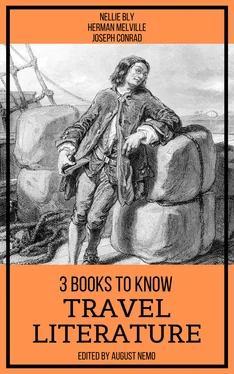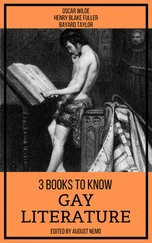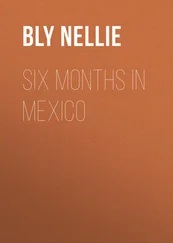1 ...7 8 9 11 12 13 ...35 He paused again as if reflecting, then added—"Of course in this you fellows see more than I could then. You see me, whom you know. . . ."
It had become so pitch dark that we listeners could hardly see one another. For a long time already he, sitting apart, had been no more to us than a voice. There was not a word from anybody. The others might have been asleep, but I was awake. I listened, I listened on the watch for the sentence, for the word, that would give me the clew to the faint uneasiness inspired by this narrative that seemed to shape itself without human lips in the heavy night-air of the river.
". . . Yes—I let him run on," Marlow began again, "and think what he pleased about the powers that were behind me. I did! And there was nothing behind me! There was nothing but that wretched, old, mangled steamboat I was leaning against, while he talked fluently about 'the necessity for every man to get on.' 'And when one comes out here, you conceive, it is not to gaze at the moon.' Mr. Kurtz was a 'universal genius,' but even a genius would find it easier to work with 'adequate tools—intelligent men.' He did not make bricks—why, there was a physical impossibility in the way—as I was well aware; and if he did secretarial work for the manager, it was because 'no sensible man rejects wantonly the confidence of his superiors.' Did I see it? I saw it. What more did I want? What I really wanted was rivets, by heaven! Rivets. To get on with the work—to stop the hole. Rivets I wanted. There were cases of them down at the coast—cases—piled up—burst—split! You kicked a loose rivet at every second step in that station yard on the hillside. Rivets had rolled into the grove of death. You could fill your pockets with rivets for the trouble of stooping down—and there wasn't one rivet to be found where it was wanted. We had plates that would do, but nothing to fasten them with. And every week the messenger, a lone negro, letter-bag on shoulder and staff in hand, left our station for the coast. And several times a week a coast caravan came in with trade goods,—ghastly glazed calico that made you shudder only to look at it, glass beads value about a penny a quart, confounded spotted cotton handkerchiefs. And no rivets. Three carriers could have brought all that was wanted to set that steamboat afloat.
"He was becoming confidential now, but I fancy my unresponsive attitude must have exasperated him at last, for he judged it necessary to inform me he feared neither God nor devil, let alone any mere man. I said I could see that very well, but what I wanted was a certain quantity of rivets—and rivets were what really Mr. Kurtz wanted, if he had only known it. Now letters went to the coast every week. . . . 'My dear sir,' he cried, 'I write from dictation.' I demanded rivets. There was a way—for an intelligent man. He changed his manner; became very cold, and suddenly began to talk about a hippopotamus; wondered whether sleeping on board the steamer (I stuck to my salvage night and day) I wasn't disturbed. There was an old hippo that had the bad habit of getting out on the bank and roaming at night over the station grounds. The pilgrims used to turn out in a body and empty every rifle they could lay hands on at him. Some even had sat up o' nights for him. All this energy was wasted, though. 'That animal has a charmed life,' he said; 'but you can say this only of brutes in this country. No man—you apprehend me?—no man here bears a charmed life.' He stood there for a moment in the moonlight with his delicate hooked nose set a little askew, and his mica eyes glittering without a wink, then, with a curt Good night, he strode off. I could see he was disturbed and considerably puzzled, which made me feel more hopeful than I had been for days. It was a great comfort to turn from that chap to my influential friend, the battered, twisted, ruined, tin-pot steamboat. I clambered on board. She rang under my feet like an empty Huntley & Palmer biscuit-tin kicked along a gutter; she was nothing so solid in make, and rather less pretty in shape, but I had expended enough hard work on her to make me love her. No influential friend would have served me better. She had given me a chance to come out a bit—to find out what I could do. No, I don't like work. I had rather laze about and think of all the fine things that can be done. I don't like work—no man does—but I like what is in the work,—the chance to find yourself. Your own reality—for yourself, not for others—what no other man can ever know. They can only see the mere show, and never can tell what it really means.
"I was not surprised to see somebody sitting aft, on the deck, with his legs dangling over the mud. You see I rather chummed with the few mechanics there were in that station, whom the other pilgrims naturally despised—on account of their imperfect manners, I suppose. This was the foreman—a boiler-maker by trade—a good worker. He was a lank, bony, yellow-faced man, with big intense eyes. His aspect was worried, and his head was as bald as the palm of my hand; but his hair in falling seemed to have stuck to his chin, and had prospered in the new locality, for his beard hung down to his waist. He was a widower with six young children (he had left them in charge of a sister of his to come out there), and the passion of his life was pigeon-flying. He was an enthusiast and a connoisseur. He would rave about pigeons. After work hours he used sometimes to come over from his hut for a talk about his children and his pigeons; at work, when he had to crawl in the mud under the bottom of the steamboat, he would tie up that beard of his in a kind of white serviette he brought for the purpose. It had loops to go over his ears. In the evening he could be seen squatted on the bank rinsing that wrapper in the creek with great care, then spreading it solemnly on a bush to dry.
"I slapped him on the back and shouted, 'We shall have rivets!' He scrambled to his feet exclaiming 'No! Rivets!' as though he couldn't believe his ears. Then in a low voice, 'You . . . eh?' I don't know why we behaved like lunatics. I put my finger to the side of my nose and nodded mysteriously. 'Good for you!' he cried, snapped his fingers above his head, lifting one foot. I tried a jig. We capered on the iron deck. A frightful clatter came out of that hulk, and the virgin forest on the other bank of the creek sent it back in a thundering roll upon the sleeping station. It must have made some of the pilgrims sit up in their hovels. A dark figure obscured the lighted doorway of the manager's hut, vanished, then, a second or so after, the doorway itself vanished too. We stopped, and the silence driven away by the stamping of our feet flowed back again from the recesses of the land. The great wall of vegetation, an exuberant and entangled mass of trunks, branches, leaves, boughs, festoons, motionless in the moonlight, was like a rioting invasion of soundless life, a rolling wave of plants, piled up, crested, ready to topple over the creek, to sweep every little man of us out of his little existence. And it moved not. A deadened burst of mighty splashes and snorts reached us from afar, as though an ichthyosaurus had been taking a bath of glitter in the great river. 'After all,' said the boiler-maker in a reasonable tone, 'why shouldn't we get the rivets?' Why not, indeed! I did not know of any reason why we shouldn't. 'They'll come in three weeks,' I said confidently.
"But they didn't. Instead of rivets there came an invasion, an infliction, a visitation. It came in sections during the next three weeks, each section headed by a donkey carrying a white man in new clothes and tan shoes, bowing from that elevation right and left to the impressed pilgrims. A quarrelsome band of footsore sulky niggers trod on the heels of the donkeys; a lot of tents, camp-stools, tin boxes, white cases, brown bales would be shot down in the courtyard, and the air of mystery would deepen a little over the muddle of the station. Five such installments came, with their absurd air of disorderly flight with the loot of innumerable outfit shops and provision stores, that, one would think, they were lugging, after a raid, into the wilderness for equitable division. It was an inextricable mess of things decent in themselves but that human folly made look like the spoils of thieving.
Читать дальше












